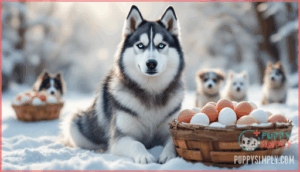This site is supported by our readers. We may earn a commission, at no cost to you, if you purchase through links.

Raw eggs pose bacterial risks and interfere with nutrient absorption, while cooked eggs deliver over 90% protein bioavailability your active dog needs. The difference between a nutritious treat and a health hazard comes down to preparation method and portion size.
Understanding how eggs fit into your husky’s diet helps you make smart choices that fuel their endurance without overloading their system.
Table Of Contents
- Key Takeaways
- Nutritional Content of Eggs (vitamins, Minerals, Protein, Fats, Etc)
- Egg Preparation Methods and Serving Guidelines
- Common Husky Health Conditions and Dietary Considerations
- Comparisons to Other Dog Breeds in Terms of Egg Consumption
- Frequently Asked Questions (FAQs)
- Can Huskies eat eggs?
- What are the risks of feeding Huskies raw eggs?
- Can Huskies eat chicken?
- Do Huskies eat raw food?
- What should a husky eat?
- Do Husky eat a lot?
- What are some creative ways I can incorporate eggs into my husky’s diet?
- Are there any risks associated with feeding eggshells to my husky?
- Can Huskies Eat Egg Shells Safely?
- Do Eggs Help With Husky Shedding?
- Conclusion
Key Takeaways
- Cooked eggs deliver over 90% protein bioavailability with complete amino acids, while raw eggs drop below 55% digestibility and carry bacterial risks like Salmonella that can cause serious health issues in huskies.
- Limit eggs to one per day maximum (or 2-3 times weekly) for adult huskies to avoid pancreatitis, weight gain, and nutrient imbalances—always serve them plain without butter or salt.
- Eggs provide essential vitamins (A, D, E, B12), minerals (selenium, iron, zinc), and healthy fats that support your husky’s high-energy lifestyle, immune function, and signature glossy coat.
- Hard-boiling at 160°F-212°F for 10-12 minutes is the safest preparation method, eliminating bacteria while preserving nutrients that fuel your husky’s endurance without disrupting their balanced diet.
Nutritional Content of Eggs (vitamins, Minerals, Protein, Fats, Etc)
Eggs pack a nutritional punch that aids your Husky’s high-energy lifestyle. Each egg delivers about 6 grams of complete protein, containing all nine essential amino acids your dog needs for muscle maintenance and repair. You’re also giving your Husky roughly 5 grams of healthy fats that fuel endurance and stamina.
The vitamin content is equally impressive. Eggs provide vitamins A, D, E, and B12, plus riboflavin—all vital for immune function, metabolism, and that signature glossy Husky coat. On the mineral front, you’ll find selenium, iron, zinc, phosphorus, and folate working together to aid bone health, oxygen transport, and cellular repair.
What makes eggs particularly valuable is their bioavailability. Your Husky’s digestive system can efficiently break down and absorb these nutrients, meaning nothing goes to waste. At 60-90 calories per egg depending on size, they won’t derail your dog’s nutritional balance when served in moderation alongside their regular diet. Eggs are a great source of daily nutrition benefits that can aid overall health and well-being.
Egg Preparation Methods and Serving Guidelines
Now that you know what eggs bring to your Husky’s bowl, let’s talk about the right way to prepare and serve them. Hard-boiling is your safest bet—it eliminates bacteria like Salmonella that raw eggs might harbor. Scrambled works too, but skip the butter and salt.
Here’s what you need to remember:
- Boil eggs for 10-12 minutes at 160°F-212°F, then cool completely before feeding
- One egg per day max for adult Huskies—puppies need less
- Mix chopped cooked eggs into kibble for variety without disrupting their main nutrition
- Never serve raw eggs due to bacteria risks and biotin absorption issues
These egg cooking tips and nutrition guidelines keep feeding dogs eggs simple and safe.
Common Husky Health Conditions and Dietary Considerations
Before you add eggs to your husky’s diet, you need to understand how they fit into your dog’s overall health picture. Huskies have specific nutritional requirements and digestive sensitivities that affect how well they tolerate different foods.
Let’s look at three key considerations that’ll help you make smart feeding choices.
Huskies Digest Raw Eggs
Your husky’s digestive system can technically process raw eggs, but the risks often outweigh the benefits. While cooked eggs offer over 90% protein bioavailability, raw eggs drop below 55% digestibility due to avidin—a compound that actually blocks biotin absorption and can lead to skin problems and poor coat quality over time.
While cooked eggs deliver over 90% protein bioavailability for huskies, raw eggs drop below 55% and block biotin absorption, risking coat and skin problems
More concerning are bacterial infections like salmonella and E. coli, which pose serious threats to huskies, especially those already prone to inflammatory bowel disease or other digestive issues. If you notice vomiting, diarrhea, or any signs of husky allergies after feeding raw eggs, contact your vet immediately.
Cooking eggs eliminates these raw egg risks while preserving nutrient absorption and supporting your husky’s overall health. It’s vital to understand the raw egg risks to make informed decisions about your husky’s diet.
Huskies Need Protein Rich Foods
Beyond basic food safety, your husky’s body demands high-quality protein sources to fuel its legendary endurance and maintain lean muscle mass. Adult huskies need at least 2.62 grams of high biological value protein per kilogram of metabolic body weight daily—puppies require even more, around 9.7–12.5 grams during critical growth phases.
That’s where eggs shine in canine nutrition. They deliver complete amino acids that support cellular repair, immune function, and that thick double coat huskies are famous for.
Just remember that protein-rich foods like eggs should complement, not replace, balanced dog food formulated specifically for husky nutrition and pet wellness needs.
Risks of Overfeeding Eggs
Surprisingly, too many eggs can backfire on even the healthiest husky. Overconsumption increases dietary cholesterol and fat, which may trigger pancreatitis flares or worsen existing metabolic issues in predisposed dogs. Huskies with sensitive stomachs or inflammatory bowel disease often struggle with dietary excess, leading to health complications you’ll want to avoid.
Watch for these overfeeding risks:
- Pancreatitis from excessive fat intake
- Weight gain and metabolic strain
- Nutrient imbalance when eggs replace balanced dog food
- Egg allergies causing vomiting, diarrhea, or skin irritation
- Biotin deficiency from raw eggs fed frequently
Stick to one egg 2–3 times weekly for ideal husky diet and nutrition without compromising dog nutrition and health.
Comparisons to Other Dog Breeds in Terms of Egg Consumption
When comparing breed tolerance across different dogs, you’ll notice that huskies manage eggs exceptionally well compared to many other breeds. As a high-energy working breed, your husky can metabolize the protein and fat in eggs more efficiently than sedentary breeds.
Research shows that egg digestive health issues affect only about 4% of dogs through egg allergies, with no breed-specific immunity—but Labrador Retrievers and West Highland White Terriers show slightly higher food sensitivity rates overall. Active breeds like Border Collies and huskies tolerate the upper range of recommended egg intake better than smaller or less active dogs.
Here’s how breed comparisons break down for egg nutrition for dogs:
| Breed Type | Weekly Egg Tolerance | Key Consideration |
|---|---|---|
| Working breeds (Huskies, Border Collies) | 2-3 whole eggs | High activity facilitates protein metabolism |
| Retrievers (Labs, Goldens) | 1-2 whole eggs | Moderate tolerance, watch for weight gain |
| Small breeds (Chihuahuas, Yorkies) | ½-1 egg | Fat content may cause digestive upset |
Understanding canine nutrition by breed helps you avoid overfeeding while maximizing benefits for your husky’s dog nutrition and health.
Frequently Asked Questions (FAQs)
Can Huskies eat eggs?
Yes, huskies can safely eat eggs as a healthy, protein-rich treat. Eggs pack essential vitamins, minerals, and fatty acids that support your husky’s coat, skin, and overall health when served in moderation.
What are the risks of feeding Huskies raw eggs?
Raw eggs can carry Salmonella and E. coli, causing serious digestive issues in your husky.
The avidin in raw egg whites also binds to biotin, potentially leading to deficiency over time.
Can Huskies eat chicken?
Chicken lands on most huskies’ favorite-foods list. Yes, your husky can safely enjoy chicken as part of their balanced diet.
This lean poultry nutrition source aids canine digestion and provides essential protein that complements other meat alternatives like eggs.
Do Huskies eat raw food?
Many huskies thrive on raw food diets that mirror their wild ancestors’ natural feeding patterns. Some owners prefer this natural feeding approach for wild diet benefits, though cooked options work equally well for canine nutrition.
Raw meat risks include bacterial contamination, so husky nutrition requires careful planning.
What should a husky eat?
A quality husky meal plan centers on balanced diets with high-quality protein, healthy fats, and essential nutrients.
Consider nutrient requirements specific to their active lifestyle, choosing commercial dog food options or fresh meals that support canine nutrition and overall vitality.
Do Husky eat a lot?
Huskies don’t eat a lot compared to their size. Their efficient metabolism means they need fewer calories than many breeds.
Daily feeding depends on activity level, but most adult Huskies thrive on moderate food portions despite their high energy.
What are some creative ways I can incorporate eggs into my husky’s diet?
Your husky will practically do backflips for these egg recipes! Mix scrambled eggs (no butter or salt) into kibble for a nutrition boost. Freeze scrambled eggs in ice cube trays for cooling treat ideas. Chop hard-boiled eggs small or mash yolks into meals.
These feeding tips work great for Husky puppies too—just keep portions smaller and prioritize their regular food for proper Husky care and feeding.
Are there any risks associated with feeding eggshells to my husky?
Yes, eggshells carry some real risks for your husky. Sharp fragments can scratch or puncture the digestive tract if not ground into a fine powder.
Even powdered shells may cause constipation or digestive issues in sensitive dogs, and excessive calcium can create nutrient imbalance problems.
Can Huskies Eat Egg Shells Safely?
Finely crushed eggshells can provide calcium for your husky, but proceed with caution. Grind them into a powder to prevent choking or intestinal blockage.
Start with tiny amounts to check for digestive upset, and consult your vet first.
Do Eggs Help With Husky Shedding?
Eggs can support coat health through high-quality protein and biotin, which promote hair growth and skin repair. They won’t stop shedding entirely—Huskies naturally shed heavily—but nutrient balance from feeding eggs may improve coat shine and reduce skin issues that worsen shedding.
Conclusion
Before the first iPhone revolutionized kitchens in 2007, dogs thrived on simple whole foods—and eggs remain one of nature’s best protein sources today. When you’re wondering can huskies eat eggs, remember this: cooked eggs deliver complete nutrition your high-energy companion needs, while raw eggs create unnecessary risks.
Stick with plain scrambled or hard-boiled preparations, limit servings to two or three weekly, and watch your husky’s coat shine. Smart feeding means matching energy demands with quality fuel—no complications required.
- https://www.dogcancer.com/articles/diet-and-lifestyle/eggs-for-dogs/
- https://www.whole-dog-journal.com/behavior/are-eggs-good-for-dogs/
- https://www.thecaninecode.co.uk/blog/can-my-dog-eat-raw-eggs-the-truth-about-feeding-eggs-to-dogs
- https://www.chewy.com/education/dog/food-and-nutrition/can-dogs-eat-eggs
- https://rawfeeding101.com/blogs/dog-nutrition/are-raw-eggs-safe-for-dogs/








